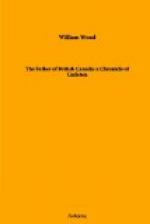The troubles that now dogged the great conciliator’s every step were of all kinds—racial, religious, social, political, military, diplomatic, legal. The confusion resulting from the intermixture of French and English civil laws had become a great deal more confounded since he had left Canada eight years before. The old proportions of races and religions to each other had changed most disturbingly. The Loyalists were of quite a different social class from the English-speaking immigrants of earlier days. They wanted a parliament, public schools, and many other things new to the country; and they were the sort of people who had a right to have them. The problem of defence was always a vexed one with the inadequate military forces at hand and the insuperable difficulties concerning the militia. The British still held the Western forts pending the settlement of the frontier and the execution of the treaty of peace in full. This naturally annoyed the American government and gave Carleton endless trouble. But more serious still was the ceaseless western march of the American backwoodsmen, who were everywhere in conflict with the Indians. The Indians, in their turn, were confused between the British and Americans under the new conditions. They and their ever-receding rights and territories had not been mentioned in the treaty. But, seeing that they would be better off under British than under American rule, they were inclined to take sides accordingly. There were now no openly hostile sides to take.




